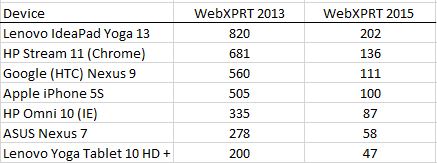As we mentioned a few weeks ago, the WebXPRT Local Notes test would not complete on recent builds of Windows 10 when using the Edge browser. Other browsers complete WebXPRT in recent Windows 10 builds without any problems.
We now know what is causing this behavior. The Local Notes test stores encrypted content in LocalStorage as UTF-16 character encoded Unicode strings. The encrypted content included values that are not considered valid characters in certain use cases. The current Edge implementation treats these characters as undefined and cannot store them. Other browsers may not have had an issue with the characters because of differences in the way they implement LocalStorage.
We’ve been able to work around this by using escape sequences for unsupported Unicode code points. Testing so far has not shown any perceptible change in results, so we believe that we will able to make this change to WebXPRT without compromising the comparability of the results.
Because this issue affects both WebXPRT 2013 and WebXPRT 2015, we’re planning to update both versions. We’ll let you know as soon as they are available.
If you’d like more details about this issue and the fix, please let us know.
Eric













